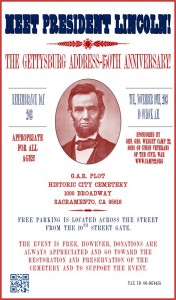“Four score and seven years ago…”
Perhaps these are the most recognized words in all of American history. They are, of course, the first six words of a short speech delivered by Abraham Lincoln. A speech that has become known as the Gettysburg Address.
On November 19, 1863, Lincoln arrived by train in the small Pennsylvania town of Gettysburg. He was there to speak at the dedication of the Soldier’s National Cemetery, where many of the dead from the Battle of Gettysburg – fought just four months prior – were buried. The day was cold and dreary, but a large crowd was on hand to see and hear the President.
 At the battle, the Union had managed to turn back the Confederate troops from the second major incursion onto northern soil. The battle raged over three sweltering days of July, and until the famous failed charge by the Confederates on the third day, the outcome of the battle was in doubt. Casualties were heavy on both sides, but at the end of the battle more than 3,000 Union soldiers lay dead in the fields of the bucolic village.
At the battle, the Union had managed to turn back the Confederate troops from the second major incursion onto northern soil. The battle raged over three sweltering days of July, and until the famous failed charge by the Confederates on the third day, the outcome of the battle was in doubt. Casualties were heavy on both sides, but at the end of the battle more than 3,000 Union soldiers lay dead in the fields of the bucolic village.
Through the lens of history, we can see that the Battle of Gettysburg was a major turning point in the war, but at the time, this was definitely not the case. The ravages of the battle were still fresh in Gettysburg, and the war as a whole was not going well for the Union. Furthermore, south-central Pennsylvania was not exactly a bastion of Union solidarity. Many residents in this border region had business and family ties down the Cumberland Valley and across the Mason-Dixon line. Hence, Lincoln’s presence at the cemetery dedication was at least partially a political maneuver designed to spark public support for the war effort.
However, as the famous events of the day unfolded, we know that Lincoln took to heart the human cost of the war: the lives lost, the families left grieving, the wounds – mental and physical – that so many were suffering. He spoke to a country that was suffering immensely and he paid tribute to the sacrifices endured, yet he also inspired hope by reminding the nation of the enduring principles for which they were fighting.


